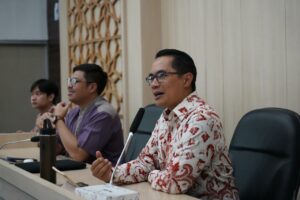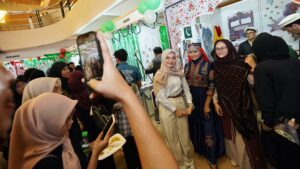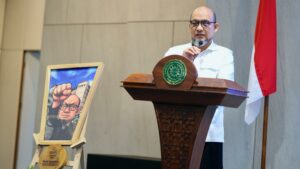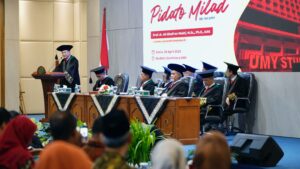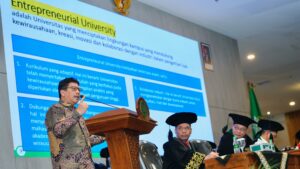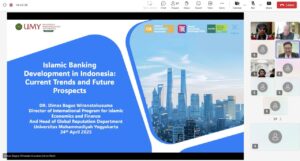Seven teams of the fifth batch of Master of Nursing of Universitas Muhammadiyah Yogyakarta (UMY) presented the findings of their research conducting for a month. “The findings were presented in a mini seminar of ‘Technology and Innovation in Medical Surgical Nursing Education’ on Saturday (21/11) at Building OSCE Center of PKU Muhammadiyah Unit II Gamping, floor 4. The seven teams comprised about four to five students. They carried out the research in Khon Kaen University Thailand, Ubon Ratchathaani University Thailand, Guangxi Medical University China, Central Taiwan University of Science and Technology, and Ifugao State University Philipines.
Director of Graduate School of UMY Dr. Ahmad Nurmandi, M.Sc. conveyed the seminar aimed at being responsible for the student exchange. “The responsibility must be written on working paper as graduate student standard. The paper, then, is presented, and it is expected to be joined in national and international competition. The paper may benefit other people so that it can inspire other researchers to do better research.
The research topics of the seven teams were distinctive. The topics were health care system to wound management based on innovation and technology in China, wound care, Diabetes management innovation, clinic practice management for patients of hypoglycemia and hyperglycemia in Thailand, cardiovascular care system in China, and others. Besides learning health care management, they also learned health equipment developed in those countries like Cryotherapy using cooler power or ice, smartphone application to control diabetes and others.
Health Treatment of Diabetes Militus Patients
Erva Elli Kristianti and her three team members examined treatment of Diabetes Militus in Thailand. She told that diabetes militus is the foremost disease issue in Thailand among the other disease like stroke, heart attack, breast cancer, and others.
Erva mentioned that the management of diabetes militus patients in Thailand is similar to the management in Indonesia. However, for the treatment, hospital parties in Indonesia may take Thailand as an example. “Diabetes militus patients are categorized into two types, namely hyperglycemia (high sugar-content) and hypoglycemia (low sugar-content). Both types may turn unsafe if the treatment is not appropriate. Both types have their own treatment,” she said.
In Indonesia, Ervan inserted, the management of hypoglycemia patients is by providing them 150-200 ml of sweet tea, juice, 6-10 candies, or 2-3 spoons of honey. When the hypoglycemia symptoms reduce for 15 minutes, it is recommended repeating the procedure. “Hypoglycemia patients may not recovery if they do not shift their lifestyle like performing controlled diet, exercises, and regular treatments,” she maintained.
She added that in Thailand the diabetes militus patients are not only suggested dieting but also provided foot treatment to walk on rock, traditional therapy, sauna, and meditation like yoga. She argued that the treatments should exist at hospitals in Indonesia since the treatments though sauna and meditation can escalate blood circulation, muscle movement, mood, and mental health. The treatments can also alleviate neuropath of the patients.

